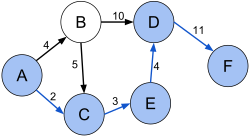In computer science, a Fibonacci heap is a data structure for priority queue operations, consisting of a collection of heap-ordered trees. It has a better...
19 KB (3,785 words) - 06:01, 30 June 2025
empty heap, which is log-linear. 2–3 heap B-heap Beap Binary heap Binomial heap Brodal queue d-ary heap Fibonacci heap K-D Heap Leaf heap Leftist heap Skew...
16 KB (2,918 words) - 13:37, 12 July 2025
strict Fibonacci heap is a priority queue data structure with low worst case time bounds. It matches the amortized time bounds of the Fibonacci heap in the...
34 KB (6,087 words) - 05:50, 29 March 2025
the Fibonacci Quarterly. Applications of Fibonacci numbers include computer algorithms such as the Fibonacci search technique and the Fibonacci heap data...
85 KB (12,946 words) - 22:47, 28 July 2025
{\displaystyle |V|} is the number of nodes. Fredman & Tarjan 1984 proposed a Fibonacci heap priority queue to optimize the running time complexity to Θ ( | E |...
45 KB (5,638 words) - 02:33, 21 July 2025
A binary heap is a heap data structure that takes the form of a binary tree. Binary heaps are a common way of implementing priority queues.: 162–163 The...
30 KB (5,127 words) - 11:33, 29 May 2025
Robert Tarjan in 1986. Pairing heaps are heap-ordered multiway tree structures, and can be considered simplified Fibonacci heaps. They are considered a "robust...
13 KB (2,270 words) - 10:22, 20 April 2025
to run in linear time even more simply, by using a d-ary heap in place of a Fibonacci heap. Let P be a connected, weighted graph. At every iteration...
18 KB (2,079 words) - 20:30, 15 May 2025
The structure is similar to a Fibonacci heap, and borrows ideas from the 2–3 tree. The time needed for some common heap operations are as follows. Delete-min...
14 KB (2,889 words) - 15:35, 25 July 2025
Priority queue (section Specialized heaps)
elements. Variants of the basic heap data structure such as pairing heaps or Fibonacci heaps can provide better bounds for some operations. Alternatively, when...
33 KB (5,009 words) - 13:57, 18 July 2025
connected components algorithm, and co-inventor of both splay trees and Fibonacci heaps. Tarjan is currently the James S. McDonnell Distinguished University...
18 KB (1,513 words) - 11:32, 21 June 2025
science, a binomial heap is a data structure that acts as a priority queue. It is an example of a mergeable heap (also called meldable heap), as it supports...
13 KB (2,566 words) - 20:02, 27 April 2024
{\displaystyle O(V^{2}\log {V}+VE)} running time with the Dijkstra algorithm and Fibonacci heap. In a non-bipartite weighted graph, the problem of maximum weight matching...
24 KB (3,032 words) - 23:25, 29 June 2025
List of data structures (section Heaps)
Bx-tree Heap Min-max heap Binary heap B-heap Weak heap Binomial heap Fibonacci heap AF-heap Leonardo heap 2–3 heap Soft heap Pairing heap Leftist heap Treap...
9 KB (914 words) - 05:55, 20 March 2025
Corporation. P-923. Fredman, Michael Lawrence; Tarjan, Robert E. (1984). Fibonacci heaps and their uses in improved network optimization algorithms. 25th Annual...
46 KB (4,790 words) - 00:08, 24 June 2025
position in the heap, allowing this decrease-priority operation to be performed in logarithmic time. Alternatively, a Fibonacci heap can perform the same...
43 KB (5,547 words) - 00:01, 20 June 2025
feedback vertex set Ferguson–Forcade algorithm Fibonacci number Fibonacci search Fibonacci tree Fibonacci heap Find find kth least element finitary tree finite...
35 KB (3,135 words) - 18:46, 6 May 2025
Brodal queue (category Heaps (data structures))
{\log \log n}}}).} Brodal queues and strict Fibonacci heaps achieve optimal worst-case complexities for heaps. They were first described as imperative data...
2 KB (914 words) - 17:49, 7 November 2024
paths between unmatched vertices). Its run-time complexity, when using Fibonacci heaps, is O ( m n + n 2 log n ) {\displaystyle O(mn+n^{2}\log n)} , where...
20 KB (2,960 words) - 14:39, 21 July 2025
{\log \log n}}}).} Brodal queues and strict Fibonacci heaps achieve optimal worst-case complexities for heaps. They were first described as imperative data...
11 KB (2,409 words) - 22:24, 19 June 2025
Comparison of data structures (section Heaps)
{\log \log n}}}).} Brodal queues and strict Fibonacci heaps achieve optimal worst-case complexities for heaps. They were first described as imperative data...
6 KB (1,345 words) - 23:22, 2 January 2025
instead of 2. Thus, a binary heap is a 2-heap, and a ternary heap is a 3-heap. According to Tarjan and Jensen et al., d-ary heaps were invented by Donald B...
13 KB (1,747 words) - 04:26, 16 July 2025
findmin(S): Get the element with minimum key in the soft heap Other heaps such as Fibonacci heaps achieve most of these bounds without any corruption, but cannot...
9 KB (1,250 words) - 17:19, 29 July 2024
Brahmagupta–Fibonacci identity Fibonacci coding Fibonacci cube Fibonacci heap Fibonacci polynomials Fibonacci prime Fibonacci pseudoprime Fibonacci quasicrystal...
1 KB (98 words) - 17:46, 14 November 2024
of the weak heap structure allow constant amortized time insertions and decrease-keys, matching the time for Fibonacci heaps. Weak heaps were introduced...
16 KB (2,127 words) - 06:20, 30 November 2023
M + J 2 log W ) {\displaystyle O(JM+J^{2}\log W)} time by using a Fibonacci heap to determine w next {\displaystyle w_{\text{next}}} instead of iterating...
41 KB (5,598 words) - 15:38, 23 May 2025
Binary space partitioning Full binary tree B*-tree Heap Binary heap Binomial heap Fibonacci heap 2-3 heap Kd-tree Cover tree Decision tree Empty tree Evolutionary...
7 KB (663 words) - 02:52, 24 September 2024
Smoothsort (redirect from Post-order heap)
maximum. Also like heapsort, the priority queue is an implicit heap data structure (a heap-ordered implicit binary tree), which occupies a prefix of the...
18 KB (2,486 words) - 12:39, 25 June 2025
tree Red–black tree Self-balancing tree Splay tree Heap Binary heap Binomial heap Fibonacci heap R-tree R* tree R+ tree Hilbert R-tree Trie Hash tree...
40 KB (4,727 words) - 00:02, 29 May 2025











